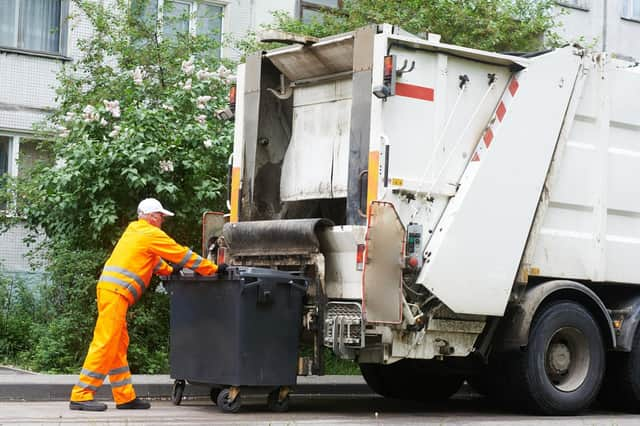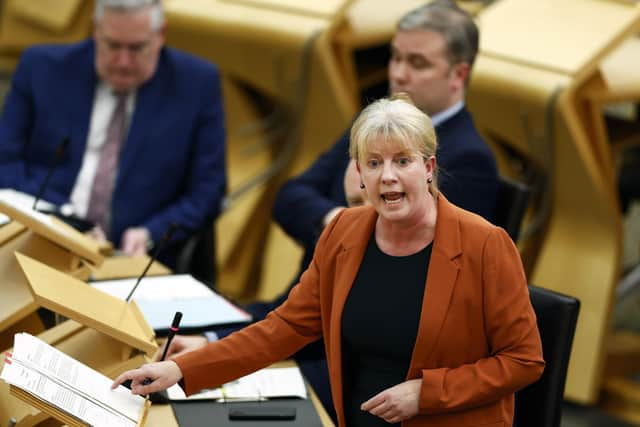Warning a quarter of Scottish councils could go 'bankrupt'


A quarter of Scottish councils are at risk of effective “bankruptcy”, a new report has claimed as figures show every single one is planning to cut its services.
In the first annual ‘local government finance in Scotland’ survey by the Local Government Information Unit (LGIU) Scotland, it says 97 per cent of councils are planning to increase their fees and 89 per cent are going to have to dip into their financial reserves due to dwindling budgets. The study also found 76 per cent believe these cuts will have a direct impact on members of the public, while nearly a quarter fear they will not be able to balance their budgets in the 2024/25 financial year.
Advertisement
Hide AdAdvertisement
Hide AdThis study has been done anonymously, so the worst-hit councils are not named.


Jonathan Carr-West, chief executive of LGIU Scotland, said: “Councils in Scotland are raising a red flag that council finances are completely unsustainable.
“With nearly a quarter of councils warning they may be unable to fulfil their statutory duties, it is only a matter of time before we see the first council in Scotland declare effective bankruptcy.
“Councils are pulling every lever available to them to balance their books.”
He added: “Councils have little to no confidence in local government finance and the issues behind the crisis are not going away.
“The Scottish Government must work productively with councils to restore trust, remove ring fencing, identify revenue streams, and reform core funding for councils to ensure residents, and particularly the most vulnerable in communities, are able to access the services they need and pay for.”
The Scottish Conservatives now say the Scottish Government must ditch “huge vanity projects” which are diverting money and attention away from frontline services.
The LGIU survey says every council would have raised council tax this year, some by a “significant” amount, had it not been frozen.
Advertisement
Hide AdAdvertisement
Hide AdCosla, the umbrella organisation for Scotland’s 32 councils, previously warned the council tax freeze and the impact of inflation means local authorities need almost £14.4 billion in their 2024/25 budgets to “stand still”.
Councillor Cammy Day, leader of Edinburgh Council, previously told The Scotsman it could lose out on £20 million if the tax freeze is not fully funded.
The Scottish Conservatives are now saying the council tax freeze and years of “SNP mismanagement” now need to be reversed to avoid cuts to essential council services.
Liz Smith, the party’s finance and local government spokeswoman, said: “We have now reached the point where council figures are completely unsustainable, and almost a quarter of them say that they are effectively bankrupt.
“Every single one is planning cuts and almost all intend to raise fees and charges.
“This is the predictable consequence of years of SNP mismanagement and underfunding, and of the sudden U-turn that introduced a council tax freeze - but without anyone having given any thought to where the money was to come from.
“SNP ministers have continually failed to address problems in the public sector, where reform is essential if services are to be maintained.
“They must now urgently redirect their attention to those vital services, and ditch huge vanity projects such as the National Care Service, which is diverting money and attention away from frontline provision.”
Advertisement
Hide AdAdvertisement
Hide AdCosla previously warned councils were at risk of bankruptcy unless government funding is dramatically improved.
Both Birmingham and Nottingham councils in England effectively had to declare themselves bankrupt as they issued section 114 notices which prevents spending on virtually everything but the bare bones.
It is worth noting there is no such thing as bankruptcy in Scotland - the technical term is sequestration.
Councils cannot go bust in the same way individuals or companies can, and there is no legal avenue for them to be liquidated.
In practice councils in Scotland are obliged to balance their books and if they cannot deliver a plan for a balanced budget, a chain of call-ins via external auditors could ultimately see government civil servants taking over.
Only a few weeks ago Falkirk Council warned that unless “significant steps” were taken it would not be able to balance its budget and would have to resort to this extreme measure.
A government spokesperson said Scotland is facing the “most challenging budget settlement since devolution”, and say this is as a result of high inflation and the UK Government’s autumn statement.
They added: “The Scottish Government has increased the resources available to local government in 2023/24 by more than £793m, a real-terms increase of £376m or three per cent, compared to the 2022/23 budget figures.
Advertisement
Hide AdAdvertisement
Hide Ad“Work is also ongoing with Cosla to establish a new fiscal framework for councils through the Verity House Agreement, a landmark agreement that is forging a stronger partnership between the Scottish Government and local councils through the spirit of collaboration and engagement.
“Decisions on local government budget allocations for future years are subject to the outcome of negotiations with Cosla, the results of which will be confirmed in future Scottish budgets.
“Any assumptions relating to possible future budget reductions are entirely speculative at this stage.”
They added the council tax freeze will benefit every taxpayer in Scotland as rising prices are putting strains on household finances.
This comes after the Scottish Household Survey found only two out of five Scots are satisfied with the quality of their local health services, schools and public transport – satisfaction fell from 53 per cent in 2019 to just 40 per cent in 2022.
Social Justice Secretary Shirley-Anne Somerville said the pandemic put many public services “under great strain” which has “had an impact on public confidence”.
Comments
Want to join the conversation? Please or to comment on this article.